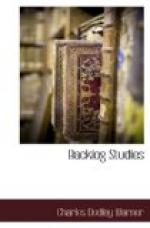Mandeville. I think the reason why the newspaper and the world it carries take no hold of us in the wilderness is that we become a kind of vegetable ourselves when we go there. I have often attempted to improve my mind in the woods with good solid books. You might as well offer a bunch of celery to an oyster. The mind goes to sleep: the senses and the instincts wake up. The best I can do when it rains, or the trout won’t bite, is to read Dumas’s novels. Their ingenuity will almost keep a man awake after supper, by the camp-fire. And there is a kind of unity about them that I like; the history is as good as the morality.
Our next door. I always wondered where Mandeville got his historical facts.
The mistress. Mandeville misrepresents himself in the woods. I heard him one night repeat “The Vision of Sir Launfal”—(The fire-tender. Which comes very near being our best poem.)—as we were crossing the lake, and the guides became so absorbed in it that they forgot to paddle, and sat listening with open mouths, as if it had been a panther story.
The Parson. Mandeville likes to show off well enough. I heard that he related to a woods’ boy up there the whole of the Siege of Troy. The boy was very much interested, and said “there’d been a man up there that spring from Troy, looking up timber.” Mandeville always carries the news when he goes into the country.
Mandeville. I’m going to take the Parson’s sermon on Jonah next summer; it’s the nearest to anything like news we’ve had from his pulpit in ten years. But, seriously, the boy was very well informed. He’d heard of Albany; his father took in the “Weekly Tribune,” and he had a partial conception of Horace Greeley.
Our next door. I never went so far out of the world in America yet that the name of Horace Greeley did n’t rise up before me. One of the first questions asked by any camp-fire is, “Did ye ever see Horace?”
Herbert. Which shows the power of the press again. But I have often remarked how little real conception of the moving world, as it is, people in remote regions get from the newspaper. It needs to be read in the midst of events. A chip cast ashore in a refluent eddy tells no tale of the force and swiftness of the current.
Our next door. I don’t exactly get the drift of that last remark; but I rather like a remark that I can’t understand; like the landlady’s indigestible bread, it stays by you.
Herbert. I see that I must talk in words of one syllable. The newspaper has little effect upon the remote country mind, because the remote country mind is interested in a very limited number of things. Besides, as the Parson says, it is conceited. The most accomplished scholar will be the butt of all the guides in the woods, because he cannot follow a trail that would puzzle a sable (saple the trappers call it).




